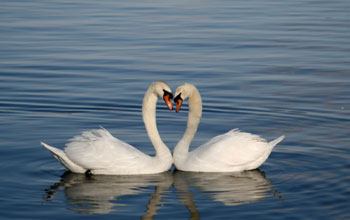News Release 12-022
Live Chat About the Science of Love on February 9
Scientists will answer your questions about how biology influences relationships in humans and other species

Learn about the biology of love and what the latest research says about our most powerful emotions.
February 7, 2012
This material is available primarily for archival purposes. Telephone numbers or other contact information may be out of date; please see current contact information at media contacts.
Do you want to understand what makes "good chemistry" in relationships--literally? If so, on February 9 at 3 p.m. EST, please participate in a live, online chat about the huge influence of certain attachment-promoting brain hormones on:
- Relationships between people--including relationships between romantic partners, between parents and their children and even between people and their pets.
- The different bonding/pairing styles of various wildlife species.
Who
This chat will be hosted by ScienceNOW, the daily news site of the journal Science, and it will feature:
- Diane M. Witt, the leader of the Neural Systems Cluster and a program director at the National Science Foundation.
- Marc Bekoff, a professor emeritus of ecology and evolutionary biology at the University of Colorado, Boulder and the author of The Emotional Lives of Animals.
Potential topic coverage:
You may ask our experts what the latest research says about these and other topics:
- Why love may literally make your heart go pitter patter and your knees go weak.
- Biological factors that may compound grief that is triggered by temporary separations or break-ups.
- Why human mothers usually instantly bond with their babies at first sight.
- Why even a quick hug can mean so much.
- Why women tend to form wider social networks than men.
- What we know, so far, about the influence of brain hormones on the ability of individual people to bond with others?
- The reasons for the varying bonding/pairing patterns across the animal kingdom, including monogamy (some rodent and canine species), polygamy (lions) and even long-term social pairing between male and female partners that involves partners mating with individuals outside of their own pairs. (Hint: do birds really deserve to be called "love birds?")
- Why mothers and/or fathers in some animal species are devoted to rearing their offspring while those in other species abandon their offspring at birth or shortly thereafter.
- The possible relationships between abnormal hormone levels of certain brain hormones in humans and anti-social behaviors.
How to participate
To participate in this chat, visit the chat page on February 9 from 3 to 4 p.m. EST and submit your questions. A transcript of the chat will be archived on the ScienceLIVE Web site.
This chat is part of Science's weekly series of chats on the hottest topics in science; these chats are held every Thursday at 3 p.m. EST.
-NSF-
Media Contacts
Jane J. Lee, Science, (202) 326-6627, email: jlee@aaas.org
Lily Whiteman, National Science Foundation, (703) 292-8310, email: lwhitema@nsf.gov
The U.S. National Science Foundation propels the nation forward by advancing fundamental research in all fields of science and engineering. NSF supports research and people by providing facilities, instruments and funding to support their ingenuity and sustain the U.S. as a global leader in research and innovation. With a fiscal year 2023 budget of $9.5 billion, NSF funds reach all 50 states through grants to nearly 2,000 colleges, universities and institutions. Each year, NSF receives more than 40,000 competitive proposals and makes about 11,000 new awards. Those awards include support for cooperative research with industry, Arctic and Antarctic research and operations, and U.S. participation in international scientific efforts.
Connect with us online
NSF website: nsf.gov
NSF News: nsf.gov/news
For News Media: nsf.gov/news/newsroom
Statistics: nsf.gov/statistics/
Awards database: nsf.gov/awardsearch/
Follow us on social
Twitter: twitter.com/NSF
Facebook: facebook.com/US.NSF
Instagram: instagram.com/nsfgov


